The Toshiba OCZ VX500 (256GB, 512GB, 1024GB) SSD Review
by Billy Tallis on September 13, 2016 9:00 AM ESTRandom Read Performance
The random read test requests 4kB blocks and tests queue depths ranging from 1 to 32. The queue depth is doubled every three minutes, for a total test duration of 18 minutes. The test spans the entire drive, which is filled before the test starts. The primary score we report is an average of performances at queue depths 1, 2 and 4, as client usage typically consists mostly of low queue depth operations.
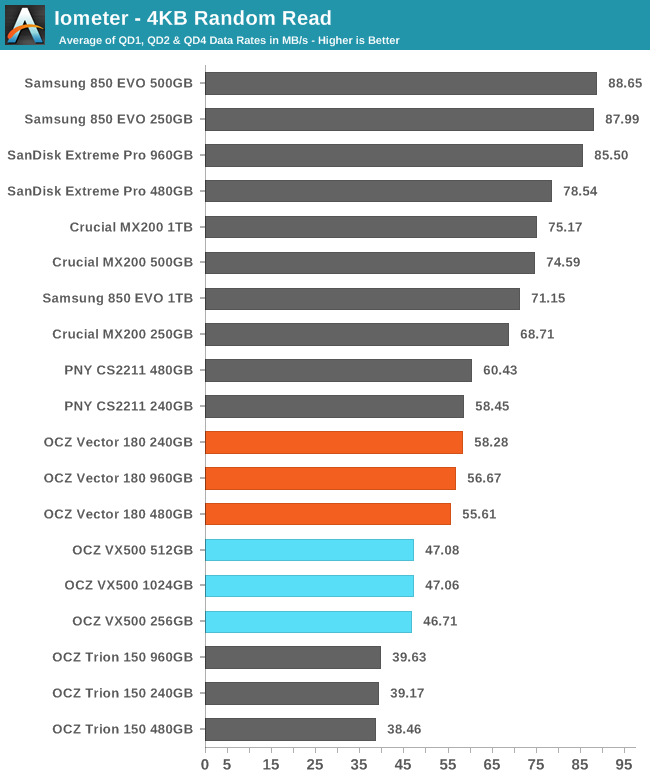
The random read speed of the VX500 is significantly slower than the Vector 180, to the point that some planar TLC SSDs are slightly faster, but it is still ahead of the Trion 150.
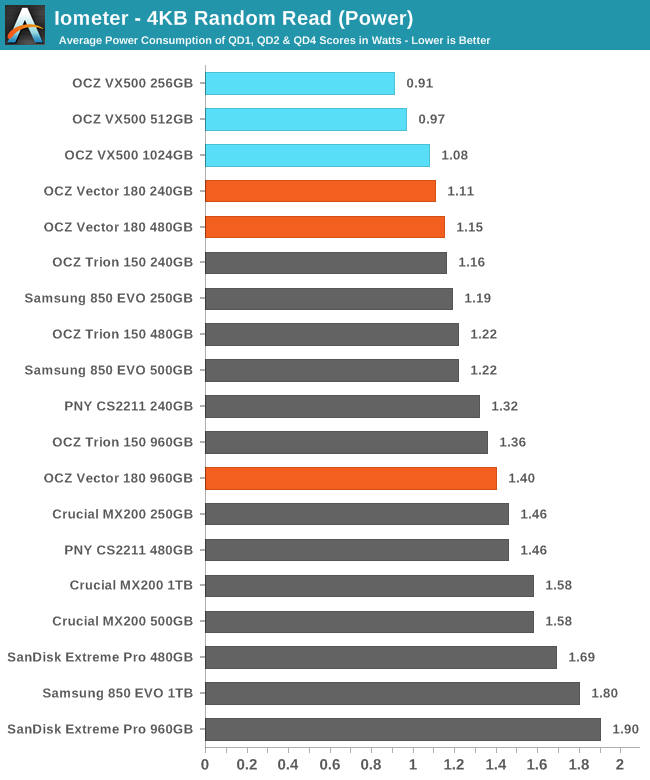
Power consumption during random reads is low enough that the VX500 maintains approximately the same load efficiency of the Vector 180 despite the speed disadvanatge.
 |
|||||||||
The VX500's performance scales well with queue depth but doesn't quite hit the level the Samsung 850 EVO and a few other drives top out at.
Random Write Performance
The random write test writes 4kB blocks and tests queue depths ranging from 1 to 32. The queue depth is doubled every three minutes, for a total test duration of 18 minutes. The test is limited to a 16GB portion of the drive, and the drive is empty save for the 16GB test file. The primary score we report is an average of performances at queue depths 1, 2 and 4, as client usage typically consists mostly of low queue depth operations.
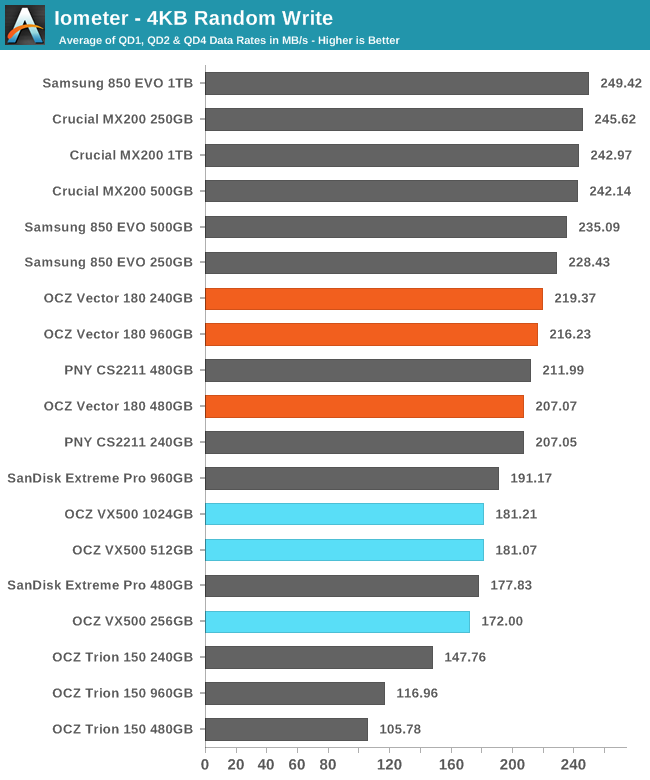
While the Vector 180 dominated the hour-long random write consistency test, it is only average on this shorter test of lower queue depths. The VX500 falls behind, but is still in the typical range for MLC SSDs.
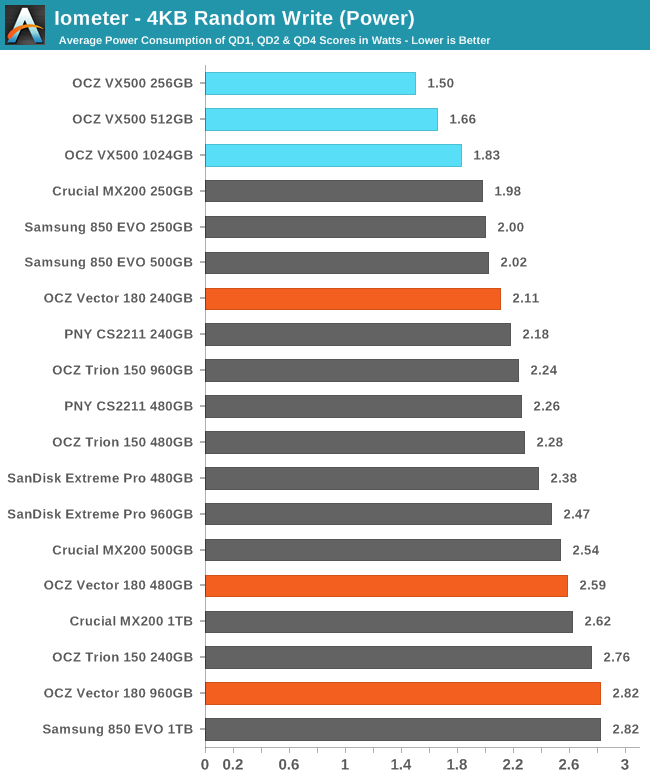
Power consumption of the VX500 is once again quite low, representing a significant improvement in efficiency over the Vector 180 and a good overall efficiency score.
 |
|||||||||
The VX500 random write performance plateaus at queue depth 4 instead of continuing toward high peak numbers, but this hardly matters for typical client workloads. The 256GB model also begins its transition from burst performance toward steady state before the test is complete and begins to stutter:


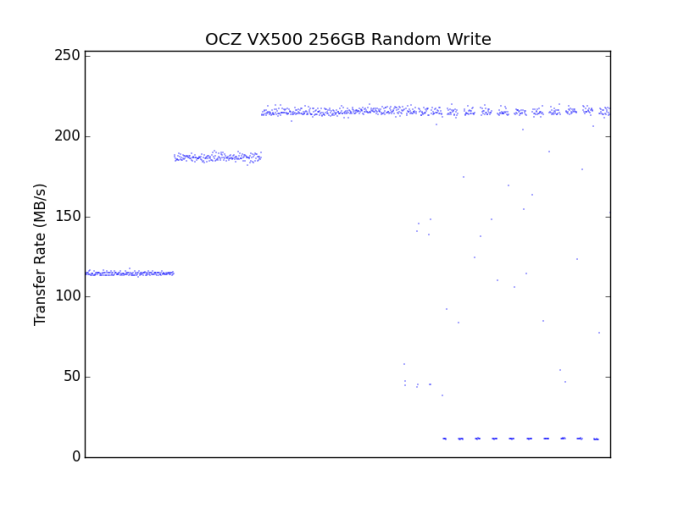








29 Comments
View All Comments
Lolimaster - Tuesday, September 13, 2016 - link
LOL $337? You can get 1TB and 1 500GB Crucial MX500 with just a few more bucks.Lolimaster - Tuesday, September 13, 2016 - link
MX3002016, still no edit button, GG.
sonicmerlin - Tuesday, September 13, 2016 - link
Feels like SSD prices/GB have been pretty stagnant the last couple years.rhysiam - Wednesday, September 14, 2016 - link
They have dropped significantly. Check out the price table from the 850EVO launch review which was less than two years ago. Cheapest $/GB drive was the 240GB ARC 100 @ 42c/GB. That table in this article has a bunch of drives cheaper than that, and it's mid-range SATA drives. There are entry level 480GB drives going today that are only $10 more than the budget 240GB drives from less than two years ago.I'd call that pretty reasonable progress on the $/GB front.
rhysiam - Wednesday, September 14, 2016 - link
Here's the table from the 850EVO launch review: http://www.anandtech.com/show/8747/samsung-ssd-850...sonicmerlin - Wednesday, September 14, 2016 - link
The EVO was always higher priced. Look at the average prices:https://pcpartpicker.com/trends/price/internal-har...
They've come down, but not as dramatically as before. I remember well over a year ago being able to buy a SDD for 25 cents/GB on a good deal, and now it's about 20 cents/GB. Perhaps it's because of the slow transition to 3D NAND, but I'm hoping the pace picks up again.
Hiniberus - Wednesday, September 21, 2016 - link
When will these go on sale? I'm curious about them but I can't find any store that has them in stock!superunknown98 - Friday, September 23, 2016 - link
I don't really understand the final words giving the drive praise. It didn't seem to perform that much better compared other drives, including it's predecessor. Even in ATSB-Destroyer it had middling performance with good power consumption.cargostud - Thursday, February 2, 2017 - link
I had a VTR1-25SAT3-512G with a 5 year Warranty. It has 4k Random Write: 95K IOPS; 4k Random Read: 100K IOPS according to the specs. It died a few weeks ago and it is being replaced with a VX500. It has a spec of 4k Random Write: 64K IOPS; 4k Random Read: 92K IOPS. The replacement drive is slower than the one I had before. Wouldn't a more fair replacement be a VT180? 4k Random Write: 90K IOPS; 4k Random Read: 90K IOPS